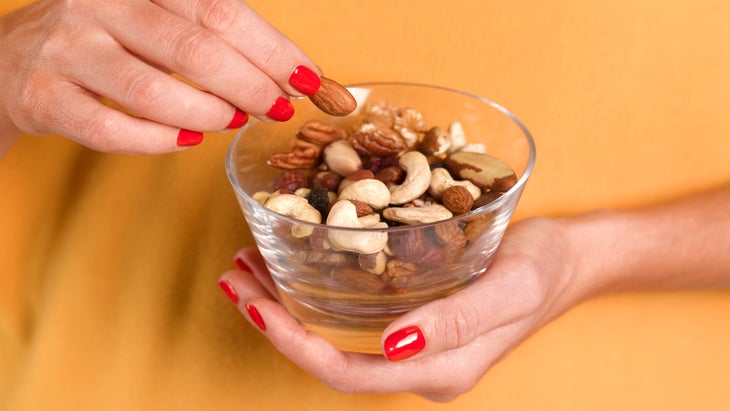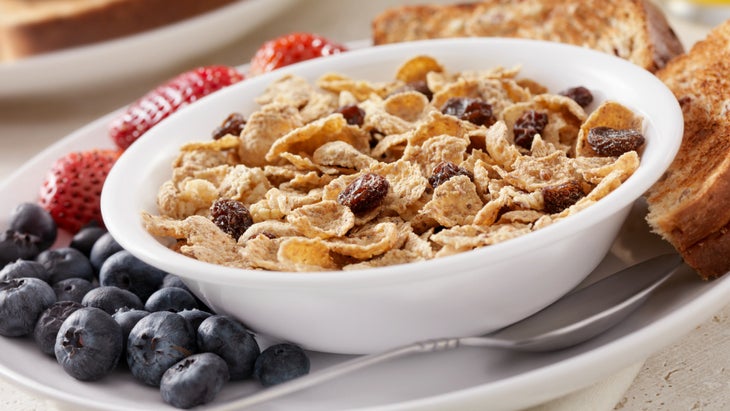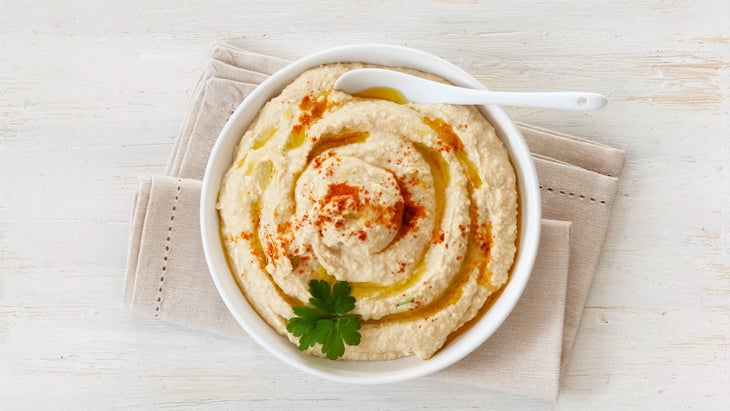10 Simple Swaps to Add More Fiber to Your Diet

“], “filter”: { “nextExceptions”: “img, blockquote, div”, “nextContainsExceptions”: “img, blockquote, a.btn, a.o-button”} }”>
Heading out the door? Read this article on the new Outside+ app available now on iOS devices for members!
>”,”name”:”in-content-cta”,”type”:”link”}}”>Download the app.
There’s no escaping the constant nutrition headlines urging you to add more fiber to your diet. But why is this message so prevalent?
Fiber — a type of carbohydrate found in plant foods — appears to help regulate blood sugar and cholesterol levels, boost immunity and maintain weight, research shows. Fiber also helps add bulk to the stool and prevents constipation, so there are plenty of good reasons to add more fiber to your diet.
One unusual thing about fiber is that your body can’t fully digest or absorb it, which is exactly what makes it so healthy. “Because fiber is not fully digested by the body, it moves slowly through the digestive system, helping us to feel full for longer and eat less calories overall,” says Ashley Larsen, RDN, California-based dietitian.
An active woman consuming 2,000 calories per day needs about 28 grams of fiber per day. But more than 90 percent of women fall short on fiber, consuming only 15 to 16 grams per day. If you’re not one of the 10 percent, don’t double your consumption in one fell swoop; increase your fiber intake slowly to avoid stomach discomfort.
Read on to discover how easy it is to add more fiber to your diet through whole grains, fruits, in-season vegetables, beans, nuts and legumes.
1. Bake with fruit.
Use pureed fruit as a replacement for added sugar in recipes. “Pureed fruit provide a great source of fiber and can be used in a 1:1 ratio to replace added sugar in baked goods while maintaining all the sweetness,” says Erin Palinski-Wade, RD, CDCES, New Jersey–based diabetes expert, author of 2 Day Diabetes Diet and consultant to the Hass Avocado Board.
2. Add an avocado.
Avocados contain 3 grams of fiber per serving (one-third of a medium avocado). Eat a few avocado slices on top of scrambled eggs, on a sandwich or on a salad. Mashed avocado can even replace butter with a 1:1 ratio in recipes. “Adding avocado to smoothies is a nondairy hack that adds a thick, creamy texture plus an additional fiber boost,” Palinski-Wade says.
3. Power up pasta.
“Increase your fiber intake by swapping a more refined grain or starch with a whole grain,” Larsen says. “You can swap a cup of white rice for a cup of quinoa or barley to increase your fiber intake from zero grams to 6 grams per cup.”

4. Nosh on nuts.
Nuts are also a good source of fiber. “I like to snack on pistachios and add them to everything from overnight oats to fruit-based nice cream,” says Amy Gorin, MS, RDN, plant-based registered dietitian. Top nuts for fiber include almonds (4 grams), hazelnuts, pistachios and pecans (3 grams each per 1-ounce serving).
5. Just add beans.
Research shows that people who regularly eat beans are 22 percent less likely to be obese, when compared to people who don’t eat them. “If you aim to go meatless at least once a week, use beans or lentils as your protein source,” Larsen suggests. “Not only are beans high in protein, [but] they are also one of the highest sources of fiber.” To add more fiber to your diet, use beans and lentils instead of meat in dishes like enchiladas, chili or quinoa bowls — 1 cup of black beans provides 15 grams of protein and 15 grams of dietary fiber.
6. Fill cookies with fiber.
Did you know you can enjoy a sweet treat and still fill up on fiber? When crafting your next batch of cookies, add chopped nuts or a cup of nut butter, use oats instead of white flour or try a bean-based energy ball recipe. Yes, beans in cookies are a thing, so don’t be scared!

7. Give breakfast a boost.
“Start your day with a boost from a good source of whole grains and fruit,” Larsen says. “A bowl of bran cereal topped with a ½ cup of blueberries can provide around 14 grams of fiber, which is already 56 percent of the Daily Value.” A high-fiber breakfast also helps keep you satisfied until lunch.
8. Sub in seeds.
Don’t underestimate the tiny seed. A tablespoon of a high-fiber seed like flaxseed or chia seeds are easily blended into a smoothie or sprinkled on a salad or oatmeal. Larsen recommends making a protein smoothie with 1 cup of fruit and vegetables and a tablespoon of flaxseeds or chia seeds for a quick and satisfying meal.

9. Have hummus on hand.
Store-bought or homemade hummus is a versatile and delicious way to add fiber. Use it as a dip for vegetables and whole-grain crackers or spread it on a sandwich in place of mayonnaise.
10. Snack on fruit.
Whole apples, bananas and oranges are easy-to-grab snacks that deliver a couple of grams of fiber. Add some filling fats — and a couple more grams of fiber — to your snack with a spoonful of nut butter or a handful of nuts.








